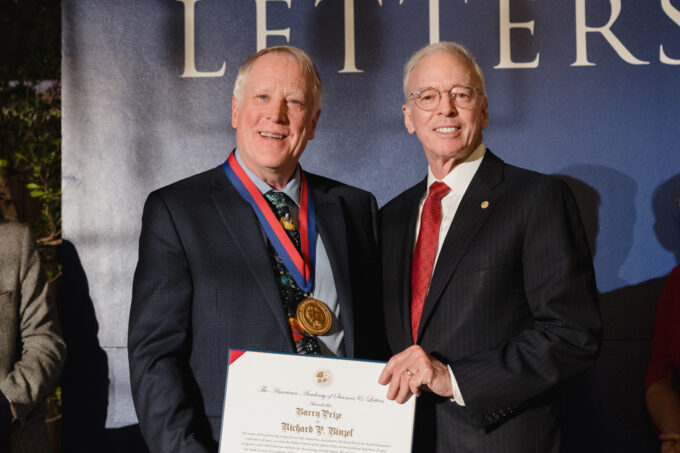Richard Binzel awarded 2025 Barry Prize for Distinguished Intellectual Achievement

Professor Post-Tenure Richard Binzel was awarded a Barry Prize for Distinguished Intellectual Achievement from the American Academy of Sciences and Letters at a ceremony held in Washington, D.C. on November 12. Photo Credit: Theo Milo
Earth, Atmospheric and Planetary Sciences (EAPS) Professor Post-Tenure of Planetary Science Richard Binzel has been awarded a 2025 Barry Prize for Distinguished Intellectual Achievement from the American Academy of Sciences and Letters (AASL). Each year, the Barry Prize recognizes ten scholars for “extraordinary achievement and dedication to excellence in the arts, sciences and learned professions.”
Binzel received the award at a ceremony held in Washington, D.C. on November 12. Selected for his “distinguished contributions to humanity’s knowledge of the cosmos, and its desire to discover what lies beyond the panorama of the darkened sky,” the prize comes with a $50,000 cash award and Academy membership.
“These awards span such a wide range of scientific and academic endeavors that it is humbling to be recognized at all,” says Binzel. “I am most grateful for the kind and generous founders and members of the Academy for their warm reception.”
Professor Binzel’s decades of research have pioneered the study of asteroids, meteorites, and planets. He is the inventor of the Torino Sale, a method for categorizing the impact hazard of near-Earth objects (NEOs) such as asteroids and comets. He is a co-investigator on the NASA OSIRIS-REx asteroid sample return mission, which will be extending its mission parameters to investigate the asteroid Apophis, and is working on the NASA Psyche and Lucy missions. His earlier research helped map the surface of Pluto and earned him the position of co-investigator on NASA’s New Horizons mission.
The AASL, founded in 2023, “promotes learning and honors outstanding scholarly excellence and intellectual courage in the humanities, social sciences, natural sciences, mathematics, and engineering,” according to their website. Now in its third year, Barry Prize recipients are nominated by members of the Academy and appointed by the board of directors. In addition to this year’s prize announcements, MIT Professor Post-Tenure of Electrical Engineering and Computer Science Shafrira Goldwasser was named a member of the Academy at the ceremony held at Washington’s historic Decatur House.


